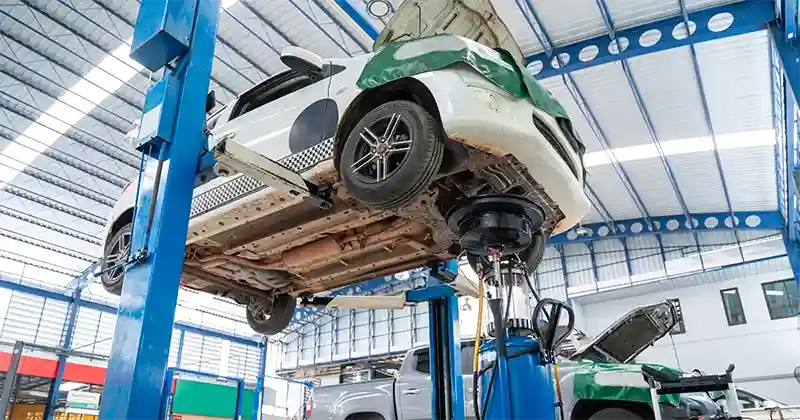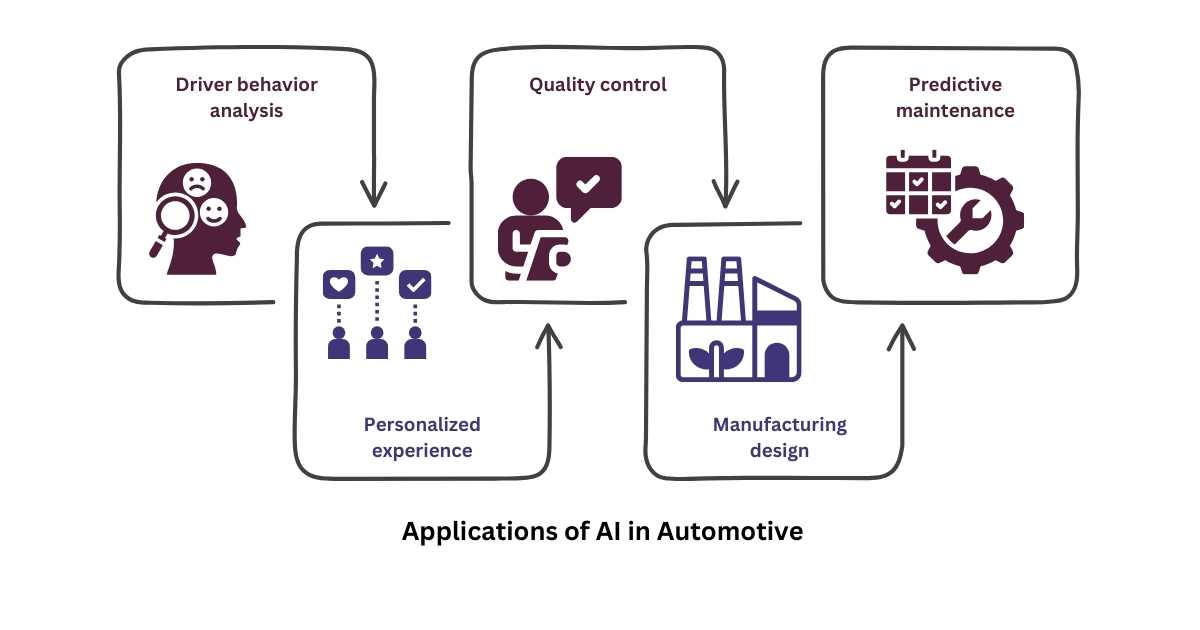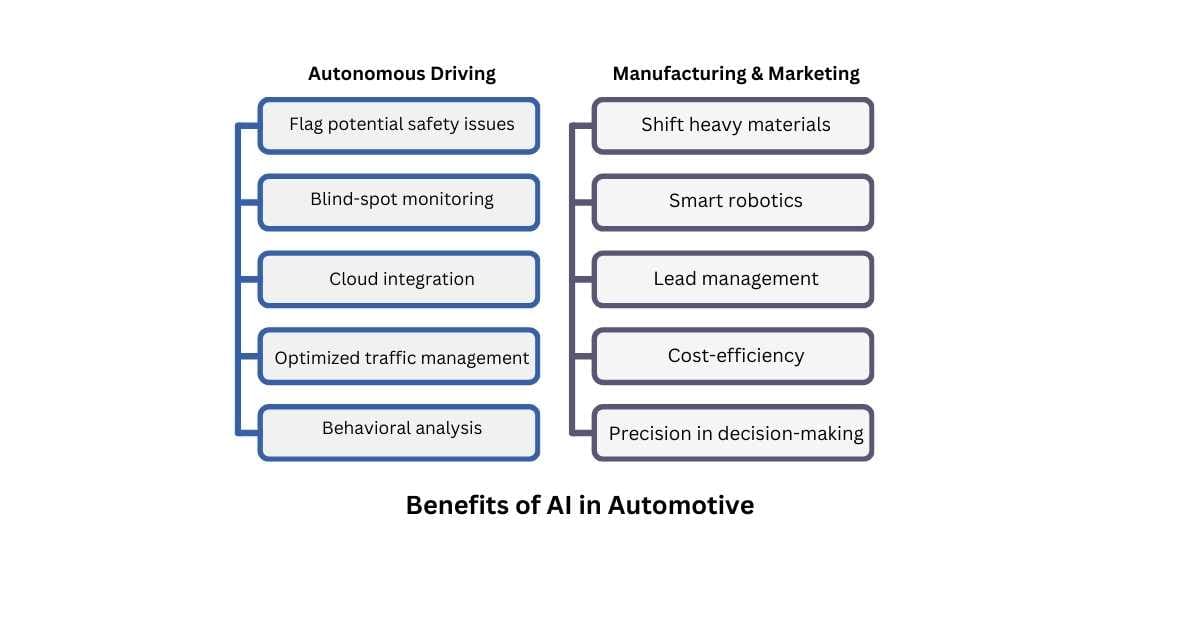What is AI in Automotive Industry?
AI in Automotive Industry is an artificial intelligence exhibited by computer systems to rapidly collect, analyze, process, and act on large & diverse datasets, and support near-real-time decision-making in the automotive industry. It simplifies complex business operations and allows employees to work with precision.
ERP Software is a versatile software that integrates Artificial Intelligence and Machine Learning algorithms to analyze large datasets and identify trends, patterns & correlations that might be otherwise missed by humans.
What are the Applications of AI in Automotive?
As Artificial Intelligence technology continues to evolve, it is becoming increasingly adopted across multiple industries. Here are its practical applications in the automotive industry:
1. Driver Behavior Analysis
According to a report by the World Health Organization (WHO), accidental crash is the 8th major factor leading to deaths across the world, and sleepiness is a major contributor to it. AI’s eye-tracking algorithms constantly monitor the driver’s eyes, head position & body movements to look for drowsy behavior. Accordingly, the AI will automatically wake up the driver.
2. Quality Control
AI-integrated Manufacturing ERP revolutionizes the manufacturing process and speeds up defect identification. AI algorithms perform quality control checks at every level of the manufacturing process, compare the product quality with the Acceptable Quality Limit, and notify the manufacturer about potential defects before the vehicle reaches the final consumer.
3. Personalized Experience
AI-powered music & video streaming systems in the vehicles add to the passenger’s entertainment. AI analyzes the user’s listening habits, mood & individual tastes, and accordingly builds a curated playlist of music for a far more superior & engaging experience.
4. Manufacturing Design
AI-powered Automotive ERP streamlines various manufacturing processes from planning, tracking, and designing, to resource management. It reduces the amount of time taken for design approvals and promotes better workflow.
5. Predictive Maintenance
Predictive maintenance is a key benefit of the Maintenance Software. It collects data about the vehicle’s real-time condition and performance using various sensors attached to it. This data is used to analyze the engine performance, temperature range, and wear & tear, and accordingly plan maintenance activities to minimize disruptions and increase asset lifespan.
Prominent Benefits of AI in Automotive Industry
Artificial Intelligence contributes to various aspects such as driving, road safety, and manufacturing & marketing of vehicles. Here are its prominent benefits:
I. Autonomous Driving
1. Flag Potential Safety Issues
AI-powered vehicles deploy advanced driver assistance systems that use 360-degree cameras to perceive the surrounding environment, perform internal computations, and prioritize the safety of drivers & passengers. They alert drivers about potential dangers and safety issues in real time and take autonomous measures to prevent such situations.
2. Blind Spot Monitoring
AI integrates with multiple sensors connected to your vehicle, which act as cross-traffic detectors. These sensors play a vital role in emergency braking, improving emergency response time, driver-assist steering, blind-spot monitoring, and other features that ultimately contribute to the safety & security of the passengers.
3. Cloud Integration
Other benefits of AI in automotive industry include cloud integration. Cloud ERP constantly monitors different components of your vehicle and sends the data to the remote servers operated by the vehicle manufacturer. This data is then used to train the AI models, enhance the existing safety mechanisms, and then sent back to the car owners in the form of software updates. Additionally, it helps fix various glitches such as overheating engine, and battery backup issues.
4. Optimized Traffic Management
AI-powered smart algorithms allow smooth & faster re-routing of vehicles and detection of potholes & other objects. They play a critical role in improving traffic safety, reducing congestion, and making driving a safe & smooth experience.
5. Behavioral Analysis
AI uses the data collected from the vehicle’s cameras and sensors to predict the behavior of other drivers driving on the same road and make smart decisions in real time. Such behavioral analysis significantly reduces traffic, disruptions, and fatal road accidents.
II. Manufacturing & Marketing
1. Smart Robotics
Smart robotics is among the most prominent benefits of AI in automotive industry. AI-powered Smart Robotics work alongside their human counterparts and perform tenuous jobs that require tremendous strength and extra mobility. They work in hazardous situations surrounding toxic chemicals, tight spaces, and darkness. They can lift heavy loads without posing injury to humans.
2. Lead Management
With AI-powered Business Management Software, businesses can develop a lean production system, and transform process layouts into products. Moreover, the combined use of Artificial Intelligence (AI), Machine Learning (ML), and Big Data helps businesses gain qualified leads, and enhance the effectiveness of marketing campaigns through a Lead Management System.
3. Cost-efficiency
The production management tools align your production schedules with the changing market demands and allocate the right resources at the right time to meet your manufacturing needs. The use of AI helps companies avoid over-production, maintain a balanced inventory, and reduce waste.
4. Precision in Decision-making
The Business Intelligence Tools free up your staff for more productive operations. Lesser manual work translates into higher efficiency & lower human errors. AI-generated accurate forecasting and consolidated reports help decision-makers grab new opportunities and generate consistent revenue.
5. Shift Heavy Materials
Automated Guided Vehicles (AVGs) are used to shift heavy materials and machines. Artificial intelligence empowers businesses with automated path detection and route adjustments.
Limitations of AI in Automotive Industry
No technology is perfect, and AI is not an exception. Here are the major limitations of deploying Artificial Intelligence AI in the automotive industry:
1. Technological Glitch
Software bugs & glitches in the Driver Assistance Systems (ADAS) can pose serious safety & security threats to passengers, other vehicles, and passersby.
2. Compliance Issues
As the self-driving vehicles industry is rapidly evolving, there is a constant need to monitor the regulatory requirements. Thankfully, an ERP Application can be a great aid in ensuring higher adherence.
3. Intellectual Property Rights
There are debates about the legality of the data used to train AI modules. Some people and businesses believe that AI companies are in violation of intellectual property rights.
New Trends in the Self-driving Vehicle Industry
The self-driving cars industry is experiencing rapid economic growth, thanks to the adoption of Artificial Intelligence (AI) and Machine Learning (ML). Here are the new trends in the industry:
1. AI Integration in EVs
AI is reshaping the landscape of the electronic vehicle industry. The EV industry uses AI to optimize the battery lifespan, strengthen its energy-saving mechanisms, and elevate the driving journey.
2. Vehicle-to-Everything (V2X)
The Vehicle-to-Everything (V2X) technology facilitates communication between cars and their surroundings (such as traffic signals) to simplify and safeguard the journey. V2X is the first step towards building roads for fully autonomous vehicles.
3. Custom Vehicle Personalization
AI has empowered businesses in the automotive sector with unprecedented manufacturing design opportunities and supply chain management tools to cater to the different needs of their customers and provide a personalized experience.
4. Research in New AI Models
There is increasing research on the development of new AI music models that are based on advanced algorithms that provide a superior level of accuracy and are able to analyze data & provide near-real-time solutions accurately.
Wrap Up
The automotive industry is undergoing a major shift and has witnessed significant innovations in recent years. The adoption of data analytics, machine learning, and AI in the automotive industry is set to drive transformations in the industry, manage risks effectively, and develop a higher level of trust among consumers.
Sage X3 is a versatile software that lets automotive companies harness the transformative power of generative AI, adapt to changing industry needs, and embrace a multitude of benefits the technology offers.
FAQs
1. How Does AI in Automotive Industry Play a Pivotal Role in Vehicle Safety?
AI plays a pivotal role in vehicle safety. Here’s how:
- Speed Management: AI monitors the driving speed and external objects (such as vehicles & passersby). It may lower the vehicle speed to maintain a safe distance and prevent accidents.
- Automated Emergency Breaking System: The AI consistently monitors the driver’s eye & body movements. If the driver is not paying enough attention, emergency breaks may be applied.
- Lane-keeping Assistance: AI lowers the risk of vehicle accidents caused by lane departures with the help of integrated sensors and cameras.
- Road Condition Prediction: AI helps reduce vehicle accidents caused by unexpected potholes & objects by consistently predicting road conditions & applying the braking system wherever required.
2. What are the Benefits of Predictive Maintenance?
Preventive Maintenance enables businesses to reduce the instances of machine breakdown and increase the lifespan of assets by continuously monitoring the machine performance through sensors, and recording the data in real-time. According to the data gathered from the machine performance, the AI generates curated reports with a maintenance plan to maximize the lifespan of the asset and reduce maintenance costs.
3. How Do Car Makers Benefit from AI?
If you’re a car manufacturer, here are several ways you can benefit from the deployment of AI:
- Quality Control: Unlike humans, AI monitors physical defects on a consistent basis throughout the entire production cycle to detect & prevent defects before actual shipment to the customer.
- Reduced Waste: AI helps car manufacturers reduce wastage by aligning production resources and eliminating excess stock of inventory.
- Demand Forecasting: AI-supported Best ERP Software in India consolidates data from a wealth of data sources, and aids businesses with timely & accurate demand forecasting.
- Process Automation: AI reduces dependence on manual labor work, and promotes process automation to improve efficiency in the day-to-day business operations.
4. How Do Car Dealers Benefit from AI?
There are several ways car dealers benefit from AI-enabled ERP implementation.
- Reduce Labor Work: AI frees up your staff from repetitive tasks. It allows them to use their creativity, and focus on other productive operations.
- Better Customer Experience: The Sales Management System provides a personalized experience to the customers (such as assisting with finding the right vehicle for their budget & requirements)
- Fraud Prevention: Automotive companies deploy AI for real-time fraud detection & prevention. AI’s ability to monitor thousands of transactions in real-time lowers risks and increases profitability.
- Optimize Inventory Levels: AI-powered Inventory Management System assists businesses with inventory planning & forecasting capabilities through the analysis of historical sales data and current market conditions.
5. How Does AI Support Logistical Management?
The use of AI in the automotive industry plays a vital role in bringing down transportation costs and strengthening the supply chain network. AI assists with route planning to ascertain the most cost-effective route amid changing traffic and weather conditions. AI integrates itself with the Internet of Things (IoT) devices to measure fuel consumption, and engine temperature, and accordingly notify the driver & logistics teams.









